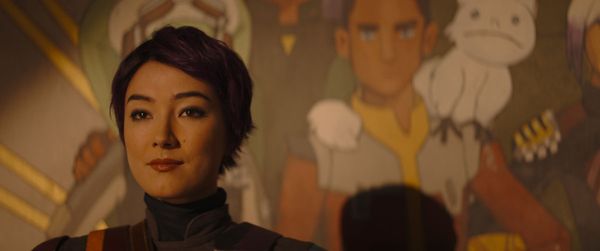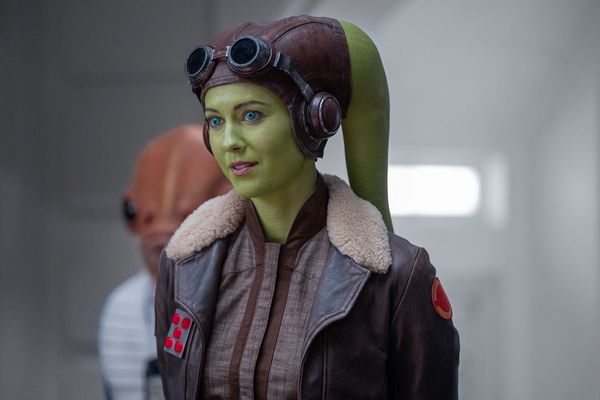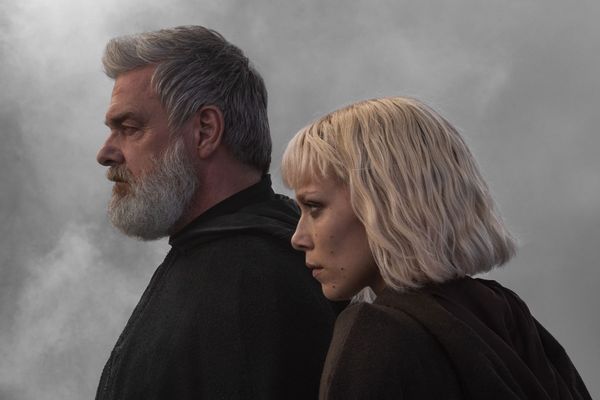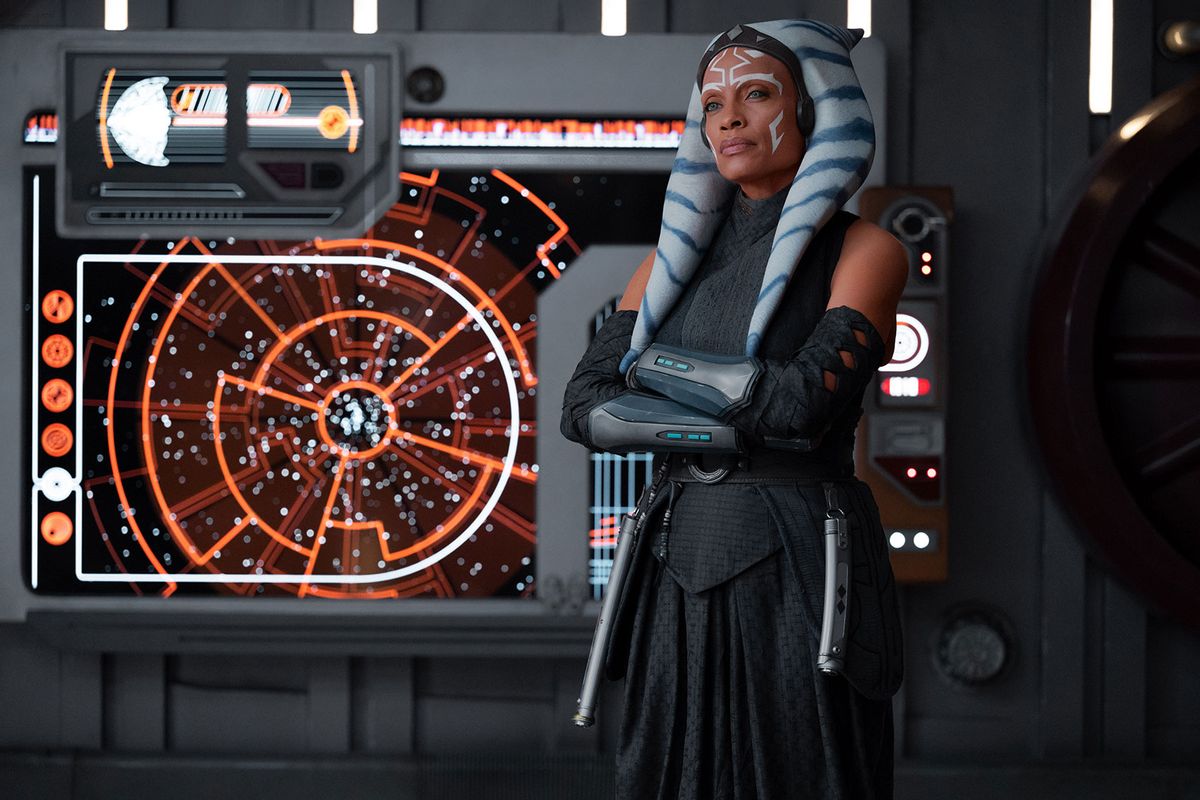“The past is the past. Move forward.”
When a series quotes what you’re thinking back to you it’s hard to hold back suspicions that its creators are aware of the audience’s skepticism. Context counts, mind you. In “Ahsoka,” the relevant scene shows the Jedi’s architect droid Huyang (voiced by David Tennant, as he does in the character’s animated version) saying this to Sabine Wren (Natasha Liu Bordizzo), the renegade Mandalorian graffiti artist who once apprenticed under Rosario Dawson’s not-a-Jedi Ahsoka.
“Ahsoka” isn’t critic-proof but . . . it’s a property that the fandom is committed to seeing through.
Sabine is hesitant to join Ahsoka’s mission because she believes her old Master won’t have her, but we know she will, as does Huyang. That’s the standard “refusing the call” step in the Joseph Campbell Hero’s Journey that serves as the architecture for “Star Wars.”
What series creator Dave Filoni doesn’t know is how many “Ahsoka” viewers grew up with Dawson’s Force-wielding character in his excellent animated series “Star Wars: The Clone Wars” or witness her evolution into a skilled operative in “Star Wars Rebels.”
 Sabine Wren (Natasha Liu Bordizzo) in “Star Wars: Ahsoka” (Disney/Lucasfilm)To compensate for this, “Ahsoka” wallows in an expository mire cloaked in nostalgic fan service, starting with a classic opening crawl. With that its intent becomes clear. The past, as it manifests in “Star Wars” titles like “Obi-Wan Kenobi,” “The Mandalorian” and “The Book of Boba Fett” isn’t going anywhere. That mode of thinking may be holding back this franchise from the evolution it desperately needs.
Sabine Wren (Natasha Liu Bordizzo) in “Star Wars: Ahsoka” (Disney/Lucasfilm)To compensate for this, “Ahsoka” wallows in an expository mire cloaked in nostalgic fan service, starting with a classic opening crawl. With that its intent becomes clear. The past, as it manifests in “Star Wars” titles like “Obi-Wan Kenobi,” “The Mandalorian” and “The Book of Boba Fett” isn’t going anywhere. That mode of thinking may be holding back this franchise from the evolution it desperately needs.
“Ahsoka” isn’t critic-proof but like “Obi-Wan Kenobi” and Boba Fett’s spinoff, it’s a property that the fandom is committed to seeing through regardless of its narrative consistency. Ahsoka, Sabine Wren and General Hera Syndulla (Mary Elizabeth Winstead) all have amply established backstories spooled throughout an animated series many Gen Z “Star Wars” fans grew up with. They’re also among the few female-centered protagonist teams we’ve seen in this franchise — certainly the only ones with extensive dialogue, agency and prolonged screen time aside from Leia Organa.
In the main, though, they are shiny new links in the product chain connected to “The Mandalorian” which, despite its mess of a third season, still engenders goodwill thanks to the appeal of its main character.
The same is likely to be true of “Ahsoka.”
 Caption Hera Syndulla (Mary Elizabeth Winstead) in “Star Wars: Ahsoka” (Disney/Lucasfilm)
Caption Hera Syndulla (Mary Elizabeth Winstead) in “Star Wars: Ahsoka” (Disney/Lucasfilm)
Through “Clone Wars” and “Rebels” TV viewers were privy to the evolution of Ahsoka Tano from a young Togruta Jedi apprentice to an apostate who retains her connection with the Force and her training. And the Force rewards her for this, as many die-hard fans noticed in 2019’s “Rise of Skywalker,” by including her in the Jedi lineage Rey calls on in a crucial moment.
If you haven’t seen those animated series, though, your emotional connection to Ahsoka and Sabine’s main mission to find their ally Ezra Bridger and the adversary with whom he’s lost, Imperial Grand Admiral Thrawn (Lars Mikkelsen, because evil roles demands nothing less than a Mikkelsen) may be lacking.
Similarly, while Dawson’s character was previewed in both “The Mandalorian” and “Boba Fett,” those who only watch Disney’s “Star Wars” live-action shows will be meeting Sabine and Hera for the first time here, and what we see gives them about as much of an identity as a charm bracelet pendant. The former is bucking orders to take a speeder ride, and the latter delivers “buck up, kid” speeches via hologram before marching into a salvage facility and declaring she’s a general.
More extensive explication is available via the reliable “Star Wars” online encyclopedia of your choice. Of course, Disney would prefer you to dive into “Clone Wars” and “Rebels” episodes setting up this show. It has assembled a collection of essential installments on its app for this purpose, only asking you to burn a few hours in the service of understanding . . . several more hours that will be streaming over the coming weeks.
While that doesn’t make it the first “Star Wars” series asking us to look back through the franchise history to appreciate it more fully, it may be the one with the most extensive prerequisite viewing. And that reminds us yet again of how a franchise like “Star Wars” benefits by exploring its galaxy through the eyes of figures we don’t know well — like Cassian Andor.
Still, given the out-of-the-box means by which “Andor” augments what we know about “Star Wars,” returning to familiar digital explosions, glow-stick fencing matches and earnest blather about searching one’s feelings feels like a regression.
The flattening of these characters in the transition from animation to live-action is a bit of a comedown.
This is said with the acknowledgment of the disparate connections the makers of “Andor” and “Ahsoka” have to this universe. Tony Gilroy applied his background in conspiracy-driven action thrillers to the origin story of Diego Luna’s renegade while Filoni is more directly connected to the old “Star Wars” ways, such as they are.
Even so, as Filoni and Jon Favreau do in their “Mandalorian” collaborations, there’s an opportunity to use a setting we know in our bones to innovate our consideration of these fables. “Ahsoka,” like “The Mandalorian” and “Boba Fett,” takes place several years after “The Return of the Jedi,” when the galaxy believes Imperial fascism to be defeated and planets are still figuring out where they stand in The New Republic.
A more crucial commonality is that their main characters aren’t Jedi, making aspects of their personality unfamiliar to most. “The Mandalorian” capitalizes on that relative mystery to explore shades of grey in a mythology long delineated in a black-and-white moral scale.
“Ahsoka” could do the same through Dawson’s warrior, the equivalent of a Harvard dropout among the remaining Force-wielders roaming the galaxy. She’s not a Jedi and no fan of the Sith, either. But despite reminding those who mention the Jedi and its protocols that the Order no longer exists, this Ahsoka certainly behaves like one to the point of almost verging into languor. Remember how Luke Skywalker became more of drip the closer he came to mastery? It’s like that.
Want a daily wrap-up of all the news and commentary Salon has to offer? Subscribe to our morning newsletter, Crash Course.
This isn’t Dawson fault or any shade on Mark Hamill’s work in those enduring movies. If anything, her Ahsoka sports a slightly elevated swagger compared to the stoic portrayals from actors like Liam Neeson and Samuel L. Jackson while capturing the series’ overall throwback feeling. The late Ray Stevenson’s former Jedi Baylan Skoll and his apprentice Shin Hati (Ivanna Sakhno) approximate this too, as if they were shown deepfake Luke Skywalkers that turned up in the Disney series and were informed that was the way for their mercenaries to act.
 Baylan Skoll (Ray Stevenson) and Shin Hati (Ivanna Sakhno) in “Star Wars: Ahsoka” (Disney/Lucasfilm)If most a show’s identity rests in its performances and the writing, then “Ahsoka” speaks of what it means to be, and what it seeks to mean to us, through these figures. The animated series loosened up Ahsoka’s character along with the emotionality of its other remaining Jedi, a reason those shows proved popular among all age groups. Since “Ahsoka” essentially drops us into the scene that ends “Rebels” at the close of its second episode, the flattening of these characters in the transition from animation to live-action is a bit of a comedown.
Baylan Skoll (Ray Stevenson) and Shin Hati (Ivanna Sakhno) in “Star Wars: Ahsoka” (Disney/Lucasfilm)If most a show’s identity rests in its performances and the writing, then “Ahsoka” speaks of what it means to be, and what it seeks to mean to us, through these figures. The animated series loosened up Ahsoka’s character along with the emotionality of its other remaining Jedi, a reason those shows proved popular among all age groups. Since “Ahsoka” essentially drops us into the scene that ends “Rebels” at the close of its second episode, the flattening of these characters in the transition from animation to live-action is a bit of a comedown.
That also speaks of a presumption that the fandom is content for these tales to remain what they always were, as if the “Star Wars” spirit were preserved in carbonite instead of trying to renew a half-century-old framework by injecting it with refreshing and unpredictable energy. If that seems like too much to expect, recall that Grogu, aka Baby Yoda, is about 50, too. Sometimes even the things we think we know can defy our expectations, reviving the stagnant into something worth believing in again.
New episodes of Ahsoka debut at 9 p.m.Tuesdays on Disney+.
Read more
about Disney’s Star Wars

